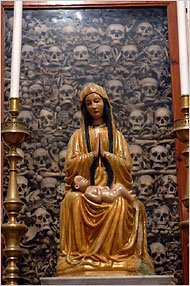
I’ve been thinking of new and interesting ways to broach the subject of Christmas and commercialism and all that. This is one way to do it.
There is a “comedy institution” in Austin, Texas, known as Esther’s Follies. Long ago, on an Austin Christmas album, they recorded this song. It’s a medley of familiar Christmas songs, with decidedly unfamiliar words. It's a piece meant to be performed by actors, so there are sound effects I can only vaguely recreate; and I can’t possibly recreate the sense of mad glee that should accompany this. But this will have to do. There are also some now archaic, as well as local, references, that date the song. But it’s message is timeless (The “X” in “X-mas,” by the way, should be very distinctly pronounced):
The Qlone Family Christmas [tunes are indicated in brackets]
[Silver Bells]
I remember in December
Buying gift after gift. It’s a feeling that’s strictly commercial
People hawking, people gawking, people catching the drift,
And in every cash draw-er you hear!
Silver coins! Dollar bills!
It’s X-mas time, cost you plenty!
Ding a lings! Charging things!
Sooner or later you’ll pay!
[change tempo, and tune: Jingle Bells]
C’mon, let’s all go flying ‘n’ shop at Highland Mall!
We’ve got a lot of buying and not much time to stall!
All of those cards and presents and things we never can use!
Hurry up, Hurry up, Hurry up, let’s go! Let’s to go the sto’!
We’ve got to buy some things you know!
Some of this, some of these, some of those, some of that!
[Just look at that hat!]
It’s fun, with a charge card in hand, buying everything that you can!
[sounds of a store pressed with shoppers, including people fighting over a sweater]
C’mon now spend that money you know that nothing is free!
You’d better use that credit or, honey, you’ve had it with me!
Pull out your BankAmericard (it’s not very hard!)
If it’s very large (use your Master Charge!)
Let’s go on an X-mas shopping spree!
[change tempo—Little Drummer Boy]
There was a drummer boy, a drummer dumb dumb
He was a dumber boy, a dumb a dumb dumb
He could not play the drums, a drum a drum drum
He played the drums real dumb a dumber dumb dumb
Dumber dumb dumb; dumber dumb dumb
Where did he come from, this drummer dumb dumb?
He is no sugar plum, a drum a drum drum
We wish he had not come, a drum a drum drum
He cannot play the drums, this drummer is dumb!
Number than numb, dumber than dumb!
We always thought he was a very good drummer!
But he was a bummer!
[Hark! The herald Angels sing]
Hark! The herald Angels sing,
shop at Sears for everything!
Peace on earth and Goodyear tires,
God replaced by man’s desires!
Joyful all you prices rise!
Datsun, Triumph, to the skies!
Hark, the herald angels sing! Sears has everything
[The Christmas Song]
Jack Frost roasting on an open fire [horrific screams in the background]
Chestnuts nipping at your nose!
Although it’s been bled many times, many ways,
Merry X-mas! Merry X-mas! Merry X-mas
To
You!










